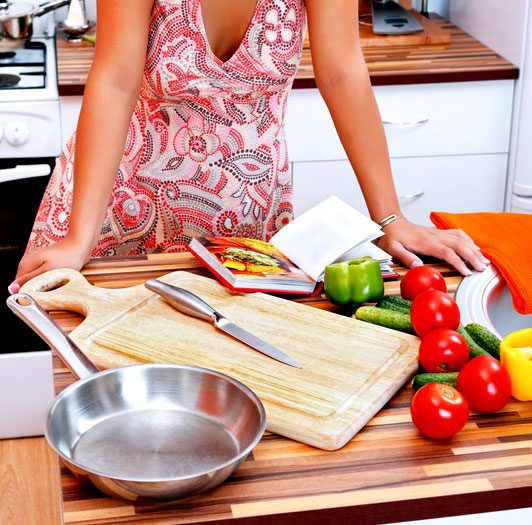
A recipe is quite a really simple a list of ingredients and preparation steps, and that’s all. Unfortunately this is not always the case.
Sometimes you may feel that a recipe found in a magazine or on a website was put together just to make you fail: approximations, missing ingredients, strange and incomprehensible terms, etc.
It’s not easy to succeed in trying a new recipe like this, so here are some tips to help you:
1. A few cooking tips
- Start by reading the recipe entirely: look at the list of ingredients, cooking time, cooking utensils.
- Search the meaning of any chef’s jargon term: if you find one, write an explanation on a post-it.
- Don’t be mistaken by the recipe’s picture: it has been shot by a professional photographer who works for another professional in a studio. It is often retouched and sometimes wrong (what you see can be inedible!). You can’t get the same result, especially at the first time. You should consider it a “serving suggestion”.
- Follow the recipe for your first attempt (if possible):Don’t substitute one ingredient for another, do not reduce or increase the cooking time or volume/weight. You can start customizing the recipe for the next time, when you start to get a confident feel for it.This is especially true for pastries (cake and pastry), which is an exact science. I mean that in a lot of cooking, you can usually easily adapt recipes to your liking — a little more of this, less than that — but for cakes and pastries, you always must be precise and meticulous. Pie dough for example needs x grams of butter, x grams of flour, etc. If you try to change these proportions, you’ll end up making glue or concrete!
- Never try a recipe for the first time when you have guests. In the case of a major flop, how will you tell this to your guests? It is best to try the recipe at a family meal occasion, especially with children as they are sure when saying if it’s good or not.
2. Look for well explained recipes
I think a good recipe must be long enough to read. Because the more details and advice there are, the more it will be easy to get great results. That’s what we try to do on these pages, following these simple rules:
- Each recipe has a brief introduction, a list of ingredients, and preparation steps
- Each stage is separated from the previous one.
- When I quote an ingredient, I always add volume or weight — “add 120 g sugar” instead of “added sugar” —.
3. Consider carefully the “worst” recipes
In newspapers and magazines, you can sometimes find short recipes given by famous chefs and celebrities, such as: ” the so-and-so’s chocolate pie”. Consider it carefully and don’t feel obliged to respect it literally as this kind of recipe, 8 lines or less, is full of approximations, omissions and errors.
In fact these quick recipes are often made of notes taken to fill articles and interviews of famous personalities, where the chef’s picture is bigger than the recipe itself. You can see these recipe as inspirations sources needing further developments and tweaking when you get more experience in cooking.

